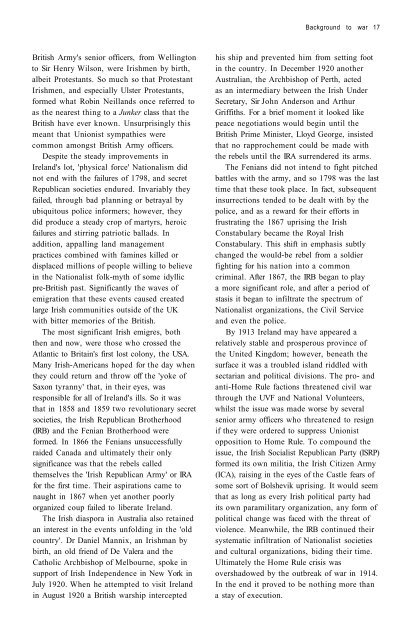You also want an ePaper? Increase the reach of your titles
YUMPU automatically turns print PDFs into web optimized ePapers that Google loves.
Background to war 17<br />
British Army's senior officers, from Wellington<br />
to Sir Henry Wilson, were <strong>Irish</strong>men by birth,<br />
albeit Protestants. So much so that Protestant<br />
<strong>Irish</strong>men, and especially Ulster Protestants,<br />
formed what Robin Neillands once referred to<br />
as the nearest thing to a Junker class that the<br />
British have ever known. Unsurprisingly this<br />
meant that Unionist sympathies were<br />
common amongst British Army officers.<br />
Despite the steady improvements in<br />
Ireland's lot, 'physical force' Nationalism did<br />
not end with the failures of 1798, and secret<br />
Republican societies endured. Invariably they<br />
failed, through bad planning or betrayal by<br />
ubiquitous police informers; however, they<br />
did produce a steady crop of martyrs, heroic<br />
failures and stirring patriotic ballads. In<br />
addition, appalling land management<br />
practices combined with famines killed or<br />
displaced millions of people willing to believe<br />
in the Nationalist folk-myth of some idyllic<br />
pre-British past. Significantly the waves of<br />
emigration that these events caused created<br />
large <strong>Irish</strong> communities outside of the UK<br />
with bitter memories of the British.<br />
<strong>The</strong> most significant <strong>Irish</strong> emigres, both<br />
then and now, were those who crossed the<br />
Atlantic to Britain's first lost colony, the USA.<br />
Many <strong>Irish</strong>-Americans hoped for the day when<br />
they could return and throw off the 'yoke of<br />
Saxon tyranny' that, in their eyes, was<br />
responsible for all of Ireland's ills. So it was<br />
that in 1858 and 1859 two revolutionary secret<br />
societies, the <strong>Irish</strong> Republican Brotherhood<br />
(IRB) and the Fenian Brotherhood were<br />
formed. In 1866 the Fenians unsuccessfully<br />
raided Canada and ultimately their only<br />
significance was that the rebels called<br />
themselves the '<strong>Irish</strong> Republican Army' or IRA<br />
for the first time. <strong>The</strong>ir aspirations came to<br />
naught in 1867 when yet another poorly<br />
organized coup failed to liberate Ireland.<br />
<strong>The</strong> <strong>Irish</strong> diaspora in Australia also retained<br />
an interest in the events unfolding in the 'old<br />
country'. Dr Daniel Mannix, an <strong>Irish</strong>man by<br />
birth, an old friend of De Valera and the<br />
Catholic Archbishop of Melbourne, spoke in<br />
support of <strong>Irish</strong> Independence in New York in<br />
July 1920. When he attempted to visit Ireland<br />
in August 1920 a British warship intercepted<br />
his ship and prevented him from setting foot<br />
in the country. In December 1920 another<br />
Australian, the Archbishop of Perth, acted<br />
as an intermediary between the <strong>Irish</strong> Under<br />
Secretary, Sir John Anderson and Arthur<br />
Griffiths. For a brief moment it looked like<br />
peace negotiations would begin until the<br />
British Prime Minister, Lloyd George, insisted<br />
that no rapprochement could be made with<br />
the rebels until the IRA surrendered its arms.<br />
<strong>The</strong> Fenians did not intend to fight pitched<br />
battles with the army, and so 1798 was the last<br />
time that these took place. In fact, subsequent<br />
insurrections tended to be dealt with by the<br />
police, and as a reward for their efforts in<br />
frustrating the 1867 uprising the <strong>Irish</strong><br />
Constabulary became the Royal <strong>Irish</strong><br />
Constabulary. This shift in emphasis subtly<br />
changed the would-be rebel from a soldier<br />
fighting for his nation into a common<br />
criminal. After 1867, the IRB began to play<br />
a more significant role, and after a period of<br />
stasis it began to infiltrate the spectrum of<br />
Nationalist organizations, the Civil Service<br />
and even the police.<br />
By <strong>1913</strong> Ireland may have appeared a<br />
relatively stable and prosperous province of<br />
the United Kingdom; however, beneath the<br />
surface it was a troubled island riddled with<br />
sectarian and political divisions. <strong>The</strong> pro- and<br />
anti-Home Rule factions threatened civil war<br />
through the UVF and National Volunteers,<br />
whilst the issue was made worse by several<br />
senior army officers who threatened to resign<br />
if they were ordered to suppress Unionist<br />
opposition to Home Rule. To compound the<br />
issue, the <strong>Irish</strong> Socialist Republican Party (ISRP)<br />
formed its own militia, the <strong>Irish</strong> Citizen Army<br />
(ICA), raising in the eyes of the Castle fears of<br />
some sort of Bolshevik uprising. It would seem<br />
that as long as every <strong>Irish</strong> political party had<br />
its own paramilitary organization, any form of<br />
political change was faced with the threat of<br />
violence. Meanwhile, the IRB continued their<br />
systematic infiltration of Nationalist societies<br />
and cultural organizations, biding their time.<br />
Ultimately the Home Rule crisis was<br />
overshadowed by the outbreak of war in 1914.<br />
In the end it proved to be nothing more than<br />
a stay of execution.



